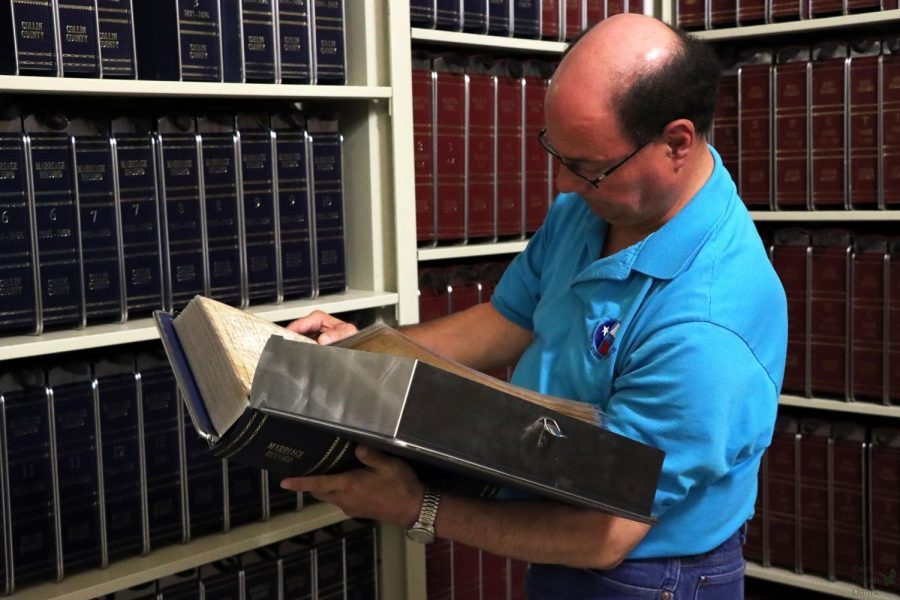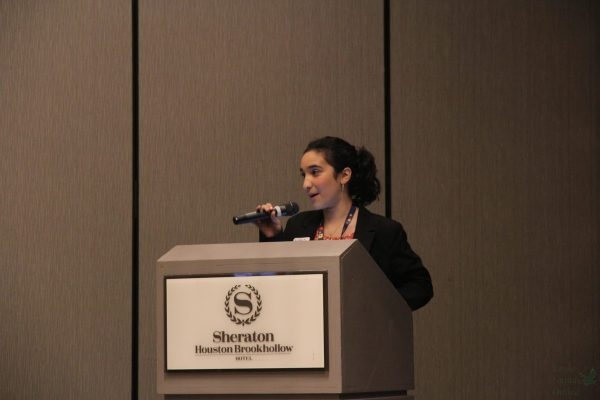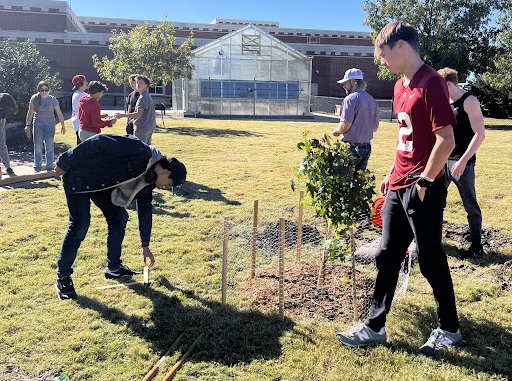Collin County Clerk Stacey Kemp preserves county records, founds genealogy corner
Paul “Tinker” Rosales reads a marriage record contained in a disaster-safe binder, stored in the shelves beneath the Collin County Courthouse. Rosales, part of a team of county employees led by county clerk Stacey Kemp, works with the office team to preserve records from 1800 to the present day. Collin County’s Courthouse is located in McKinney, Texas.
Hundreds of large metal books line the walls and fill the shelves of the large underground room. A breeze drifts slowly throughout the endless aisles, keeping the records at an ideal temperature to preserve them for the next 300 years.
Beneath the stone floors of the Collin County courthouse, the history of the county is being preserved – one record at a time.
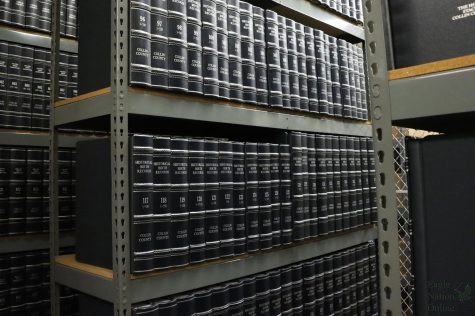
When Collin County’s current county clerk Stacey Kemp took office in 2007, she made it her goal to take charge of the records kept by the clerk’s office by preserving and digitizing them.
“Back in 2007 the law passed that we could collect money to go in and preserve documents to keep them from deteriorating to where you can’t read them,” Kemp said. “So, we collect on most things, $10 for records management, and $10 for an archive fee that goes strictly to preserving these records.”
The process of preserving the history starts when Kemp decides on what project her team will work on, and informs Paul “Tinker” Rosales, who works with the records and pulls them from the shelves, and lets Kemp know what they have before they decide how much they want to preserve for a specific project. Then the documents go out for bid, and the company awarded with the bid takes the documents for preservation.
“We put an RFP (request for purchasing) together, and the companies that qualify, the vendors, they go in and bid on the project, and then it’s awarded by what their bids are,” Kemp said.
The documents being preserved date back to before the establishment of the clerk’s office in 1846 and the establishment of Collin County in 1903. When the documents are taken to be preserved, workers must begin by removing glue, staples, pins, or anything attached to them.
“They clean it. They de-acidify it, and then they place it in protective sleeves that are non-acidic and that are approved by the state library and archives commission that are non-transferrable,” Chief Deputy Tonya Kellogg said. “That means that any of the handwriting, or whether it’s print, isn’t going to transfer onto the protective sleeve, and then we can preserve those for 300 years is what the manufacturer says.”
In addition to the physical preservation of these records, the companies who preserve them send the county a scanned copy of every record to create a permanent digital archive of these documents.
“The public can search through all those records and do genealogy research and go as far back as when Collin County was established – without touching the paper documents and further causing deterioration on those documents,” Kellogg said.
This additional mode of preservation led to Kemp and Rosales coming up with the idea of Collin County’s genealogy corner, a virtual place containing all of the old documents already preserved by the county that are not confidential. Confidential records can include anything that can be used to steal a living person’s identity or confidential court cases.
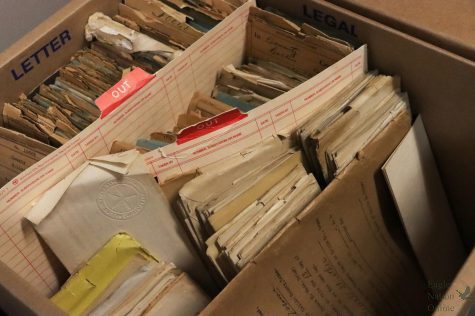
“It has old records of ours on there, and I talked to Stacey about putting our old probate records on there from 1800-1951,” Rosales said. “Those are considered historical records, and they’re permanent because we can’t get rid of them because of the house bill that was passed.”
This means that those who live in Collin County will be on record in one way or another, and permanently stored either underneath the courthouse or in the virtual database for hundreds of years to come.
“We touch your life one way or the other from the time of your birth until the time you die,” Kemp said. “We issue the birth records, the death records, marriage licenses, military discharges. If you start a new business, we’re going to issue the DBA (doing business as). If you get foreclosed on, we issue the foreclosure papers. If you die, you go through the probate department, that’s underneath me (my department), and if you go through a mental breakdown or need some help, we have the mental section that’s underneath me.”
However, the County Clerk said the office still has a long way to go with their preservations, with 9,000 boxes of records to go, but after 14 years of work, these boxes pale in comparison to their original challenge.
“One of the major goals of Stacey Kemp’s administration was to do a complete inventory of all the records that we have and then take in small increments at a time and get each record, each page of each volume, restored and imaged and preserved for future generations,” Kellogg said.
Kemp’s main objective for the project is to have every record available to the public from anywhere in the world – for free.
“The ultimate goal is to eventually get everything preserved and digitized so that the citizens of Collin County can look at all the history from the comforts of their home,” Kemp said. “I love history, and I wanted to preserve Collin County’s history for generations to come.”
Your donation will support the student journalists of Prosper High School. Your contribution will allow us to purchase equipment and cover our annual website hosting costs.

Honors & Awards:
2021 Online Tops in Texas 9th place
Dallas Morning News National High School Competition 1st place
Photographer Of The Year Prosper High School 2019-2020, 2020-2021
National Scholastic Press Association (NSPA) Best of Show Awards 4th place podcast
Southern Interscholastic Press Association (SIPA’s) Best Writing Contest 2nd place blog
Interscholastic League Press Conference 2021 Individual Achievement Awards:
1st and 2nd: Photo Slideshow
Honorable Mention: Student Life Photo
3rd: Photo Portfolio
Honorable Mention: Sports Feature Photo
3rd: Sports Action Photo
3rd: Feature Photo
2nd and 3rd: In-Depth News/Feature Package
Interscholastic League Press Conference 2020 Individual Achievement Awards:
Honorable Mention: Photo Slideshow
Honorable Mention: Photo Portfolio


